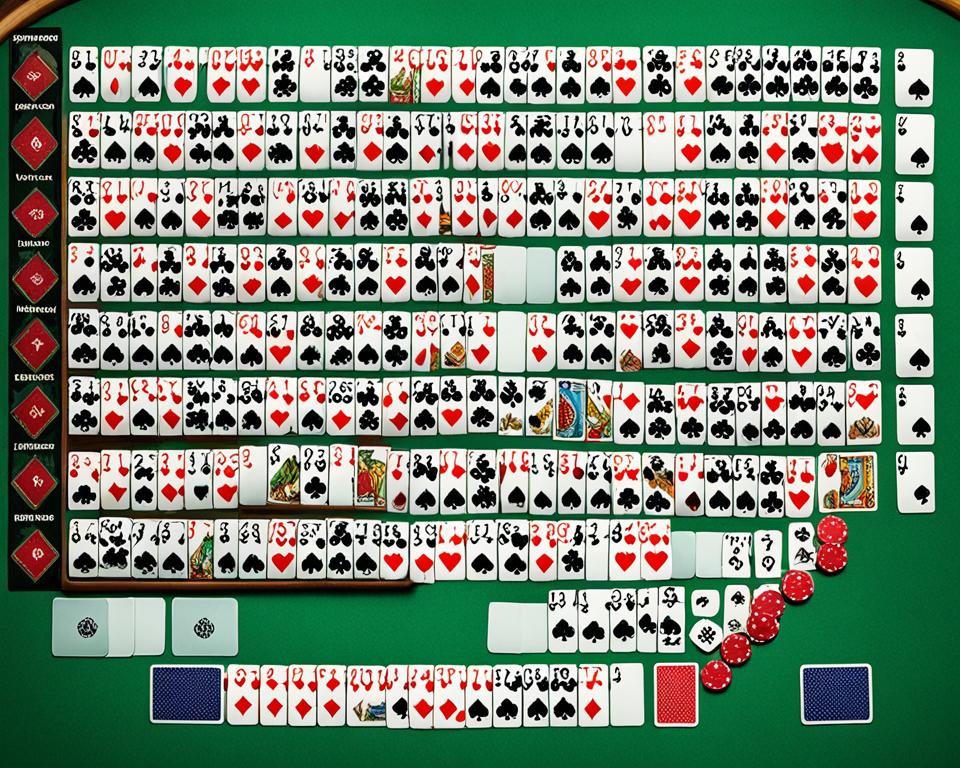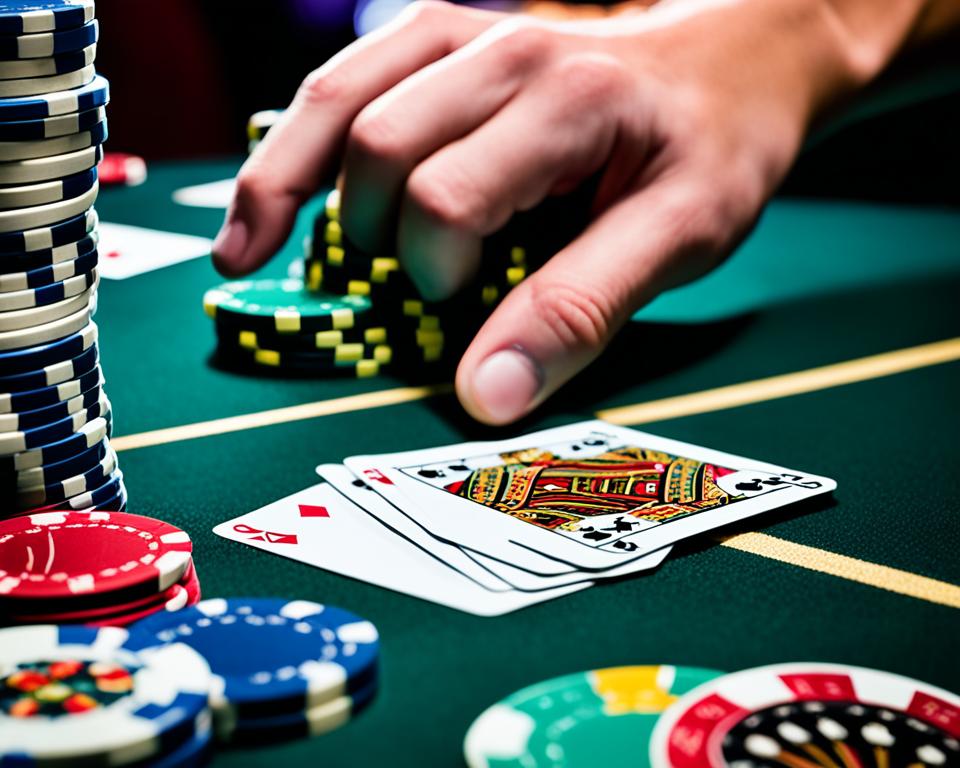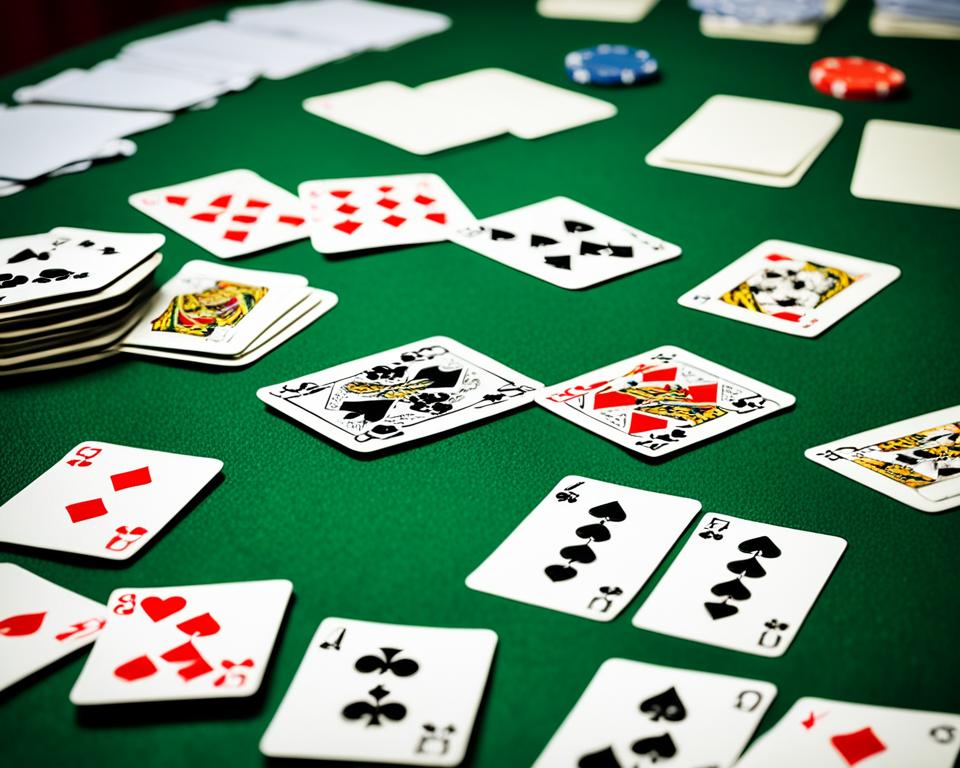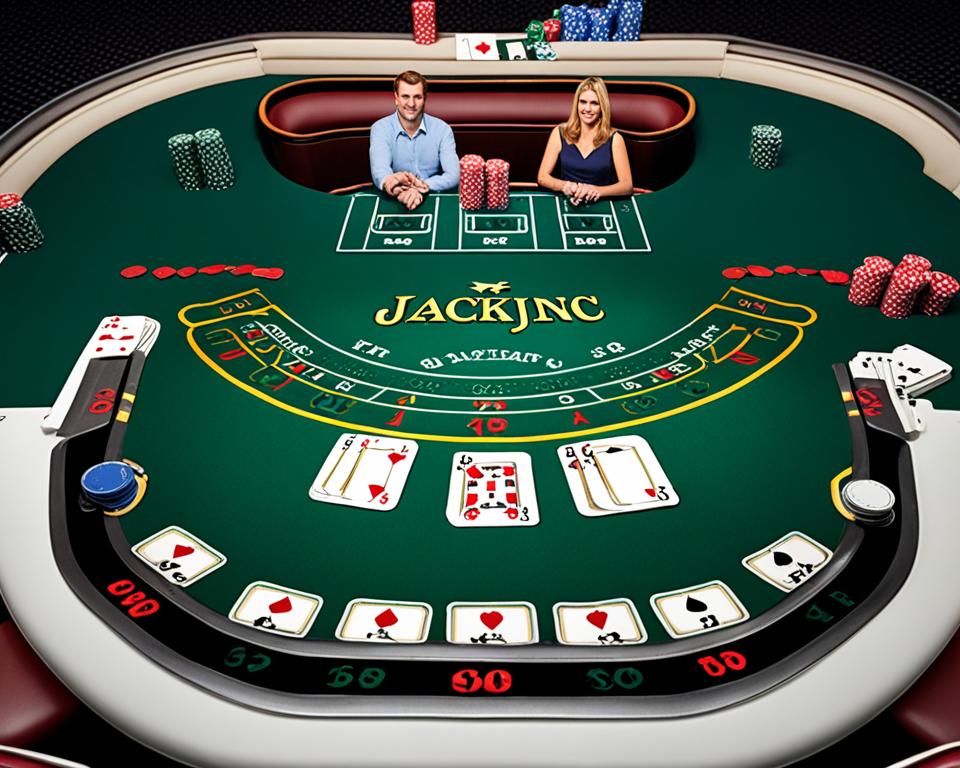If you’re a newbie blackjack player ready to hit the casino, it’s important to choose the right table. The best table for you will match your level of experience, strategy, and bankroll, and offer the lowest possible house edge and best odds.
Choosing the right blackjack table can significantly impact your overall playing experience and increase your chances of winning. In this article, we will provide you with valuable tips on how to pick the perfect table for beginners.
Key Takeaways:
- Consider the table limit to ensure it suits your bankroll and playing strategy.
- Pay attention to the number of decks used, as more decks generally result in a higher house edge.
- Look for tables with rules that favor the player, such as surrender and doubling down on any cards.
- Take note of the shuffling method, as hand-shuffled games are more favorable to players.
- Observe the dealing style and experience of the dealer to ensure a comfortable gaming environment.
Choosing the Right Table Limit
When it comes to selecting a blackjack table, one crucial factor to consider is the table limit. While the minimum and maximum wager doesn’t directly impact the house edge, it does have an influence on your playing strategies. For novice players seeking the best blackjack tables, these table limit selection tips can help maximize your chances of success.
Best Blackjack Tables for New Players
Novices should start their blackjack journey at a low-limit table. This allows you to gain experience and build your skills gradually, without risking a significant portion of your bankroll at once. By starting with lower stakes, you can familiarize yourself with the game, understand the rules, and develop your blackjack strategy.
It’s recommended to have a bankroll of at least 20-40 betting units when playing at a blackjack table. This ensures that you have enough funds to sustain your gameplay and avoid prematurely depleting your bankroll due to short games or fluctuations in luck. Planning ahead and managing your bankroll responsibly is key to maintaining a longer and more enjoyable blackjack session.
Remember, selecting the right table limit is essential for new players to ease into the game comfortably and minimize unnecessary risks. Whether you choose a low-limit table or decide to gradually increase your wager, finding the best blackjack tables for new players ultimately depends on your playing style, confidence, and budget.
“Starting at a low-limit table allows new players to gain experience and build their skills gradually.”
Number of Decks
The number of decks used in a blackjack game can significantly impact the house edge. In general, the more decks a game is played with, the higher the house edge becomes. As a novice player, it is important to be aware of the number of decks being used at the blackjack table.
When searching for the perfect blackjack table for newbies, it is advisable to look for tables that disclose the number of decks being used. Alternatively, you can observe the dealer shuffling the cards to determine the number of decks. By knowing the number of decks, you can make more informed decisions that increase your chances of success.
| Number of Decks | Impact on House Edge |
|---|---|
| Single Deck | Lowest house edge |
| Double Deck | Slightly higher house edge than single deck |
| Six-Deck | Higher house edge than double deck |
| Eight-Deck | Highest house edge |
As a beginner, it is recommended to avoid tables with six or eight decks, as they typically have a higher house edge. Instead, opt for tables with fewer decks, such as single or double deck games, as they offer more novice-friendly blackjack options.
By being mindful of the number of decks used, you can improve your chances of finding a blackjack table that suits your skill level and maximizes your potential for success.
Rules Favoring the Player vs. Rules Favoring the House
Different blackjack tables have different sets of rules that can greatly impact the house edge. As a beginner, it’s important to understand the rules and choose a table that is favorable to the player. Let’s take a look at the rules that can give you an edge and those that work in favor of the house.
Rules Favoring the Player
When selecting a blackjack table, keep an eye out for rules that benefit the player. These rules can increase your chances of winning and lower the house edge. Here are some player-friendly rules to look for:
- Surrender: Tables that offer the surrender rule allow players to give up their hand and recover half of their initial bet. This can be a valuable option if you have a weak hand.
- Early surrender: Some tables offer the early surrender rule, which allows players to surrender before the dealer checks for a blackjack. This can be advantageous if you’re dealt a weak hand against a dealer’s strong upcard.
- Late surrender: Late surrender allows players to surrender after the dealer checks for a blackjack. This rule can be useful when facing a dealer’s strong hand.
- Doubling down on any cards: Tables that allow players to double down on any two cards give you the flexibility to maximize your bets when you have a strong hand.
- Doubling down on all soft hands: Some tables allow players to double down on all soft hands, which can be advantageous when you have an ace in your hand.
- Re-splitting of pairs: Tables that offer re-splitting of pairs allow players to split the same pair multiple times, increasing their chances of forming stronger hands.
Choosing a blackjack table that offers these player-friendly rules can give you an edge and enhance your chances of success.
Rules Favoring the House
On the other hand, it’s important to be aware of rules that work in favor of the house. These rules increase the house edge and diminish your chances of winning. Here are some rules to avoid:
- Paying 6:5 for a blackjack: Some tables pay 6:5 instead of the standard 3:2 for a blackjack. This significantly increases the house edge and should be avoided.
- Even money for a blackjack: Some tables offer even money instead of the 3:2 payout for a blackjack when the dealer has an ace as their upcard. This rule also works in favor of the house and should be avoided.
By selecting a blackjack table with rules that favor the player and avoiding tables that give the house an advantage, beginners can significantly improve their chances of winning.
How Do Rules Affect the House Edge?
Each rule at a blackjack table can have a significant impact on the house edge. Understanding these rules and their effect on your chances of winning can help you make informed decisions when selecting a blackjack table. Let’s explore some of the key rules and their influence on the house edge.
Rules that Increase the House Edge
Some rules can work in favor of the casino, increasing the house edge and making it harder for you to win. For example, if the dealer hits on a soft 17, it gives them an advantage by allowing them to improve their hand. Similarly, if the table does not allow you to double down after a split, it limits your strategic options and raises the house edge.
“The dealer hitting on soft 17 and not allowing double after split can increase the house edge.”
Rules that Decrease the House Edge
On the other hand, certain rules can work in your favor, lowering the house edge and improving your chances of winning. Surrendering is one such rule that allows you to fold your hand and receive half of your bet back if you think your chances of winning are slim. Additionally, tables that permit you to re-split pairs allow for more strategic opportunities and decrease the house edge.
“Rules that allow surrender and re-splitting of pairs can decrease the house edge.”
Choosing the Best Table
By considering these rules and their impact on the house edge, you can make smarter choices when selecting a blackjack table. Look for tables that offer favorable rules that decrease the house edge, such as dealers standing on soft 17, allowing double after split, and surrender options. Avoid tables with rules that increase the house edge, like dealers hitting on soft 17 and limiting your strategic options.
| Rule | Effect on House Edge |
|---|---|
| Dealer Hits on Soft 17 | Increases the house edge |
| Double After Split Allowed | Decreases the house edge |
| Surrender | Decreases the house edge |
| Re-splitting of Pairs | Decreases the house edge |
By understanding how rules affect the house edge and selecting tables with more favorable rule sets, you can maximize your chances of winning and have a more enjoyable blackjack experience.

Next, we’ll explore the shuffling methods used at blackjack tables and how they can impact your gameplay.
The Shuffling Method Also Matters
In the game of blackjack, the way cards are shuffled can significantly impact a player’s strategy. Beginners should pay close attention to the shuffling method used at the blackjack table. Understanding the different shuffling techniques will help novice players make informed decisions and improve their chances of winning.

Hand-Shuffled Tables: Hand-shuffled tables are considered more favorable to players, especially those who employ card counting strategies. In single- and double-deck games where the dealer manually shuffles the cards, players have more opportunities to track the distribution of cards and make calculated decisions. The element of predictability and control makes hand-shuffled tables a popular choice for beginners.
Automatic Shuffling Machines: On the other hand, tables that use Automatic Shuffling Machines, such as Continuous Shuffling Machines (CSM), are less advantageous to players. These machines automatically shuffle the cards after each hand, eliminating any predictability and making card counting strategies ineffective. Additionally, CSMs increase the house edge and reduce the time available for players to make strategic decisions.
To maximize their chances of success, beginners should avoid tables that use Automatic Shuffling Machines and opt for hand-shuffled tables, where possible. By doing so, novice players can benefit from a more beginner-friendly environment that enhances their learning experience and increases their odds of winning.
Expert Tip:
Avoiding tables that use Automatic Shuffling Machines is especially important for beginners who are keen on honing their blackjack skills. By opting for hand-shuffled tables, beginners can apply basic card counting techniques and gain valuable experience in managing their gameplay strategies.
| Shuffling Method | Advantages for Beginners | Disadvantages for Beginners |
|---|---|---|
| Hand-Shuffled | Provides predictability and control |
|
| Automatic Shuffling Machines (CSM) |
|
Eliminates predictability and reduces decision-making time |
Game Rules
The specific game rules at a blackjack table can greatly impact your odds of winning. When choosing a blackjack table, it’s essential to consider the rules that give you the best chance of success. Here are some key game rules to look for:
Dealers Standing on Soft 17: Tables where dealers stand on soft 17 (an Ace and a 6) are more advantageous to players. This rule decreases the house edge and increases your chances of winning. Look for tables with dealers who stand on soft 17.
Single-Deck Games: Playing with fewer decks can also be beneficial for novice players. Single-deck blackjack games offer simpler strategies and lower house edges, making them beginner-friendly. If possible, choose tables that use a single deck.
Avoid Rule Modifications: Stay away from tables with rule modifications that can hurt your chances of winning. For instance, avoid tables that pay out 6-to-5 for natural blackjacks instead of the standard 3-to-2. Also, be cautious of tables with limited doubling down options. These rule changes increase the house edge and decrease your odds of success.
“Finding a blackjack table with favorable game rules can significantly improve your chances of winning. Look for tables with dealers standing on soft 17 and single-deck games, and avoid tables with rule modifications that don’t benefit the player.”
By selecting a blackjack table with favorable game rules, you’ll put yourself in a better position to succeed. Remember to review the rules before sitting down, and keep in mind that different casinos might have different variations. Good luck finding the perfect table!
Table Rules
When selecting a blackjack table, it’s important to consider the table rules set by the casino. By choosing a table with rules that align with your preferences and playing style, you can enhance your blackjack experience and increase your chances of winning. Here are some factors to keep in mind:
Minimum and Maximum Bet Limits
Look for tables that offer suitable minimum and maximum bet limits based on your bankroll. Beginners often prefer lower minimum bet limits to manage their risk while they familiarize themselves with the game. On the other hand, if you have a larger bankroll and are looking for the thrill of higher stakes, tables with higher maximum bet limits can accommodate your preferences.
Player Atmosphere
Avoid tables with disruptive players, as they can distract you from focusing on your own strategy. Seek out tables that provide a comfortable and friendly gaming environment, fostering a positive experience for all players. Choosing a table where fellow players are respectful and courteous can make your blackjack session more enjoyable.
Chips vs. Cash Play
Prefer tables that use chips for wagering rather than allowing cash play. Using chips not only adds to the authenticity of the gambling experience but also simplifies transactions and reduces the potential for errors and disputes. It’s easier to keep track of your bets and winnings when using chips.
Discouraging “Hit and Run” Players
Tables that discourage “hit and run” players create a more stable gaming environment. “Hit and run” players are those who quickly join a table, make a few bets, and then leave abruptly. These players can disrupt the flow of the game and create delays. By choosing a table with rules that discourage such behavior, you can enjoy a smoother gaming session.
Consider these table rules when selecting a blackjack table, and you’ll find yourself at a more beginner-friendly and novice-friendly gaming environment.
The Dealing
When selecting a blackjack table, it’s essential to pay attention to the dealing style and experience of the dealer. A skilled and attentive dealer can greatly enhance your playing experience, especially as a beginner. Here are some tips to keep in mind:
- Look for tables where cards are dealt face up or turned over by players. This allows you to see the cards and better understand the flow of the game.
- Avoid tables where the dealer frequently pauses to socialize or gives inadequate guidance to beginners. A dealer who maintains focus and provides helpful instructions can create a more supportive and enjoyable gaming environment.
- Choose a table where you are comfortable with the dealer’s pace of play and level of assistance. Some players might prefer a faster-paced game, while others may appreciate a more relaxed atmosphere. Finding a table that matches your personal preferences can contribute to a positive gaming experience.
Remember, the dealing style can vary between different casinos and tables, so take the time to observe and find a table that suits your needs as a beginner.
Table Summary
| Dealing Style | Advantages | Disadvantages |
|---|---|---|
| Face up or turned over by players | – Provides transparency – Allows better understanding of the game |
– Limited dealer interaction – Can slow down the game |
| Dealers pausing to socialize | – Provides a more relaxed atmosphere | – Less instructional guidance – May distract from the gameplay |
| Dealers giving guidance to beginners | – Offers support for novice players | – Potential interruptions to experienced players – Game pace may slow down |
“Choosing a blackjack table with a dealer who suits your preferences and provides clear instructions can greatly enhance your gaming experience.” – [Author]
Conclusion
Choosing the right blackjack table is crucial for novice players looking to enhance their blackjack experience. By considering various factors such as table limits, number of decks, rules favoring the player, shuffling methods, and the dealing style, novices can increase their chances of winning.
When selecting a blackjack table, it is important to find one with a lower house edge. Look for tables that offer favorable rules to the player, such as surrender, doubling down on any cards, and re-splitting of pairs. Additionally, consider the table’s shuffling method, as hand-shuffled games tend to be more advantageous to players.
A comfortable gaming environment is also essential. Avoid tables with disruptive players or dealers who do not provide adequate guidance to beginners. Choose a table where you feel comfortable with the dealer’s pace of play and level of assistance.
By carefully choosing the right blackjack table, novices can improve their odds of winning and enjoy a more rewarding blackjack experience.
FAQ
How do I choose the right blackjack table as a novice player?
To choose the right blackjack table as a novice player, consider factors such as table limits, number of decks, rules favoring the player, shuffling methods, and the dealing style. Look for tables with a lower house edge and a comfortable gaming environment.
What should I consider when selecting the table limit for blackjack?
When selecting the table limit for blackjack, consider your bankroll and playing strategies. As a beginner, start with a low-limit table to build your skills gradually. Make sure to have a bankroll of at least 20-40 betting units to avoid short games.
How does the number of decks used in a blackjack game affect the house edge?
The number of decks used in a blackjack game can affect the house edge. Generally, the more decks a game is played with, the greater the house edge. As a novice player, it is advisable to avoid six- and eight-deck games.
What impact do the rules of a blackjack table have on the house edge?
The rules of a blackjack table can have a significant impact on the house edge. Look for tables with rules that are favorable to the player, such as surrender, early surrender, late surrender, doubling down on any cards, doubling down on all soft hands, and re-splitting of pairs. Avoid tables with rules that favor the house, such as paying 6:5 or even money for a blackjack.
How do the rules at a blackjack table affect the house edge?
Each rule at a blackjack table can impact the house edge. For example, rules like dealer hitting on soft 17 or not allowing double after split can increase the house edge. On the other hand, rules that allow surrender or re-splitting of pairs can decrease the house edge.
How does the shuffling method at a blackjack table affect the game?
The way cards are shuffled at a blackjack table can affect player strategy. Hand-shuffled single- and double-deck games are favorable to players, including card counters. Avoid tables that use Continuous Shuffling Machines (CSMs), as they increase the house edge and decrease the time for decision-making.
What impact do the game rules have on the odds of winning in blackjack?
The specific game rules at a blackjack table can impact your odds of winning. Look for tables with rules that give you a better chance, such as dealers standing on soft 17 and single-deck games. Avoid tables with rule modifications like 6-to-5 payouts for natural blackjacks or limited doubling down options.
What should I consider regarding the table rules when choosing a blackjack table?
When choosing a blackjack table, consider the table rules set by the casino. Look for tables with suitable minimum and maximum bet limits based on your bankroll. Avoid tables with disruptive players or tables that allow cash play instead of using chips for wagering. Find tables that discourage “hit and run” players and offer a comfortable and friendly gaming environment.
What should I look for in terms of the dealing style at a blackjack table?
When selecting a blackjack table, observe the dealing style and experience of the dealer. Look for tables where cards are dealt face up or turned over by players. Avoid tables where the dealer frequently pauses to socialize or gives inadequate guidance to beginners. Choose a table where you are comfortable with the dealer’s pace of play and level of assistance.
Why is choosing the right blackjack table crucial for a novice player?
Choosing the right blackjack table is crucial for a novice player because it can enhance their blackjack experience and increase their chances of winning. By considering factors like table limits, number of decks, rules, shuffling methods, and dealing style, novices can find a table with a lower house edge and a comfortable gaming environment.





